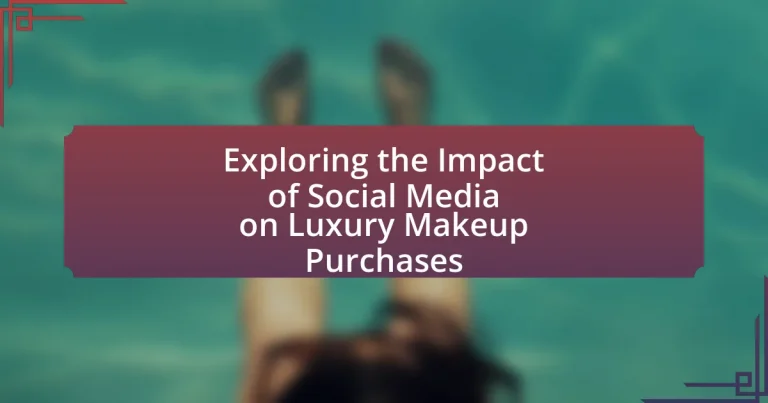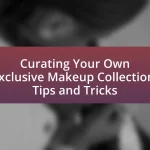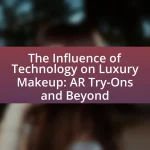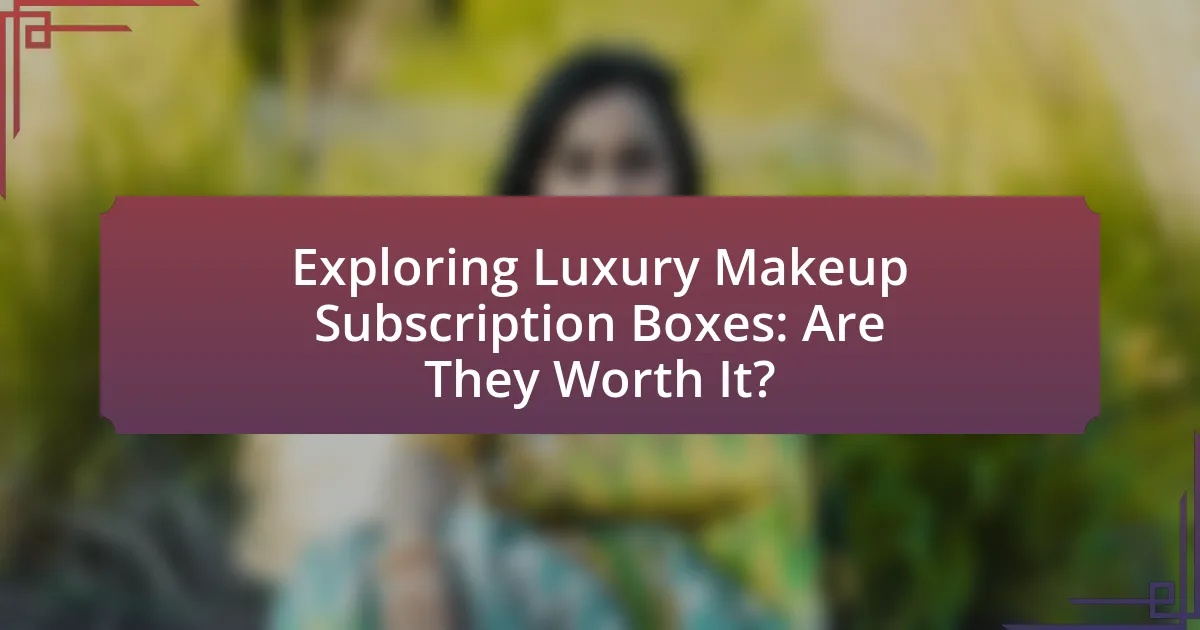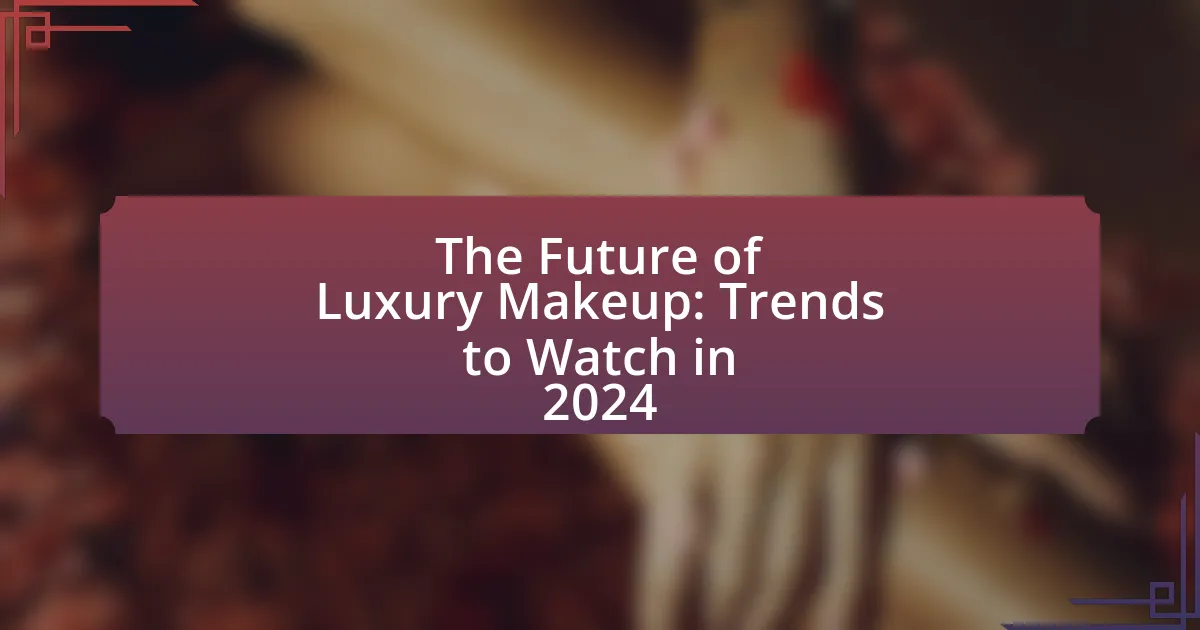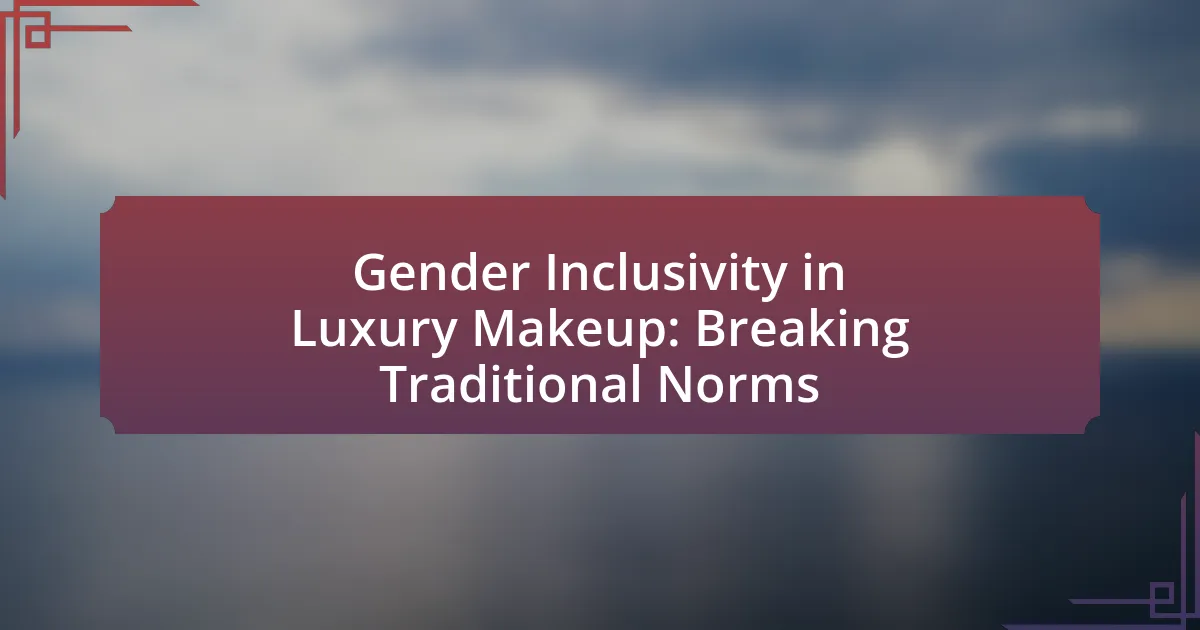The article examines the significant impact of social media on luxury makeup purchases, highlighting how platforms like Instagram and TikTok enhance brand visibility and consumer engagement. It discusses the transformation of consumer behavior in the luxury makeup market, emphasizing the role of influencers and user-generated content in shaping purchasing decisions. Key trends, challenges, and strategies for luxury brands are analyzed, including the importance of authenticity, the influence of online reviews, and the need for effective reputation management. The article also outlines best practices for leveraging social media to drive sales and maintain brand exclusivity in a competitive landscape.
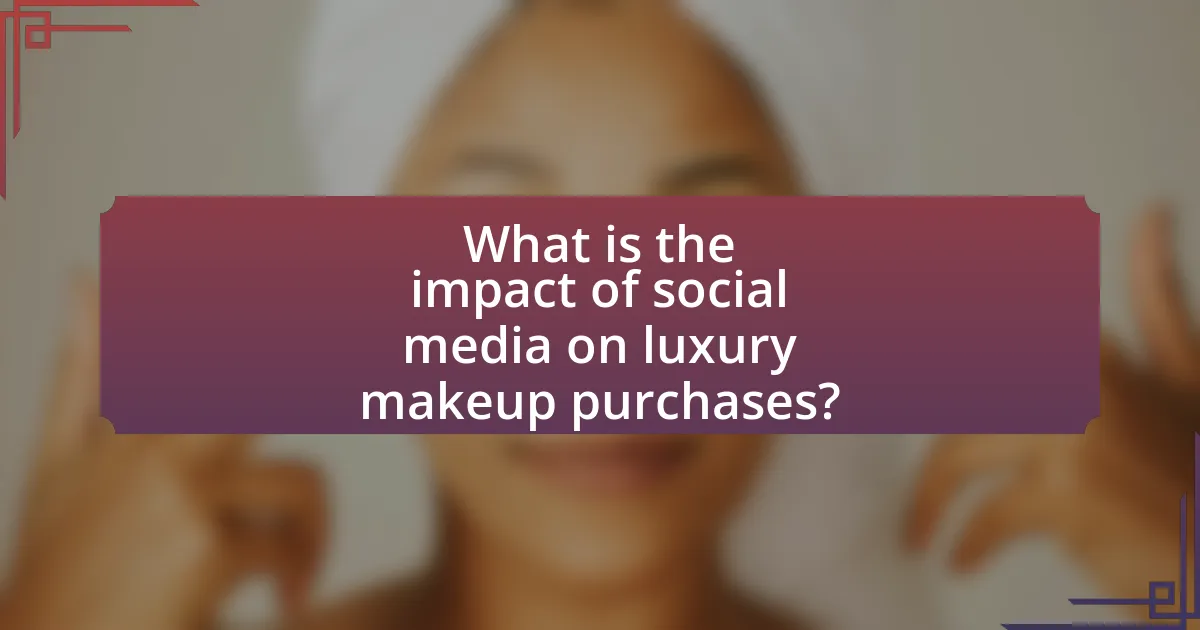
What is the impact of social media on luxury makeup purchases?
Social media significantly influences luxury makeup purchases by enhancing brand visibility and consumer engagement. Platforms like Instagram and TikTok allow brands to showcase products through visually appealing content, leading to increased consumer interest and desire. According to a study by McKinsey, 70% of consumers report that social media influences their purchasing decisions, particularly in the beauty sector. Additionally, user-generated content and influencer endorsements create a sense of authenticity and trust, further driving luxury makeup sales.
How has social media changed consumer behavior in the luxury makeup market?
Social media has significantly transformed consumer behavior in the luxury makeup market by enhancing brand visibility and fostering direct engagement between brands and consumers. Platforms like Instagram and TikTok have become essential for luxury makeup brands to showcase products through visually appealing content, leading to increased consumer interest and purchase intent. According to a study by McKinsey, 70% of consumers reported that social media influences their purchasing decisions, particularly in the beauty sector. This shift has resulted in a rise in online purchases and a demand for authenticity, as consumers increasingly seek genuine reviews and influencer endorsements before making luxury makeup purchases.
What role do influencers play in shaping luxury makeup purchasing decisions?
Influencers significantly shape luxury makeup purchasing decisions by leveraging their credibility and reach to impact consumer behavior. Their endorsements and reviews create a perception of desirability and authenticity around luxury products, often leading to increased sales. According to a study by the Digital Marketing Institute, 49% of consumers depend on influencer recommendations for their purchasing decisions, highlighting the effectiveness of influencers in driving luxury makeup purchases. Additionally, influencers often showcase luxury products through tutorials and lifestyle content, which enhances engagement and fosters a sense of community among followers, further influencing their buying choices.
How do social media platforms facilitate brand engagement in the luxury makeup sector?
Social media platforms facilitate brand engagement in the luxury makeup sector by enabling direct interaction between brands and consumers, fostering community building, and providing visually-driven content that showcases products. These platforms, such as Instagram and TikTok, allow luxury makeup brands to share high-quality images and videos, which attract and engage potential customers. For instance, a study by McKinsey & Company found that 70% of consumers are influenced by social media when making purchasing decisions, highlighting the effectiveness of these platforms in shaping consumer behavior. Additionally, features like live streaming and influencer partnerships create authentic connections, enhancing brand loyalty and driving sales in the luxury makeup market.
What are the key trends in luxury makeup purchases influenced by social media?
Key trends in luxury makeup purchases influenced by social media include the rise of influencer marketing, the impact of user-generated content, and the increasing importance of brand authenticity. Influencer marketing has become a dominant force, with 49% of consumers relying on recommendations from influencers when making luxury beauty purchases. User-generated content, such as reviews and tutorials shared on platforms like Instagram and TikTok, significantly boosts consumer trust and engagement, leading to higher conversion rates. Additionally, brands that prioritize authenticity and transparency in their messaging are more likely to resonate with consumers, as 86% of consumers say that authenticity is a key factor in their purchasing decisions.
How do user-generated content and reviews affect luxury makeup sales?
User-generated content and reviews significantly enhance luxury makeup sales by building trust and authenticity among consumers. Research indicates that 79% of consumers trust online reviews as much as personal recommendations, which is crucial for luxury brands that rely on perceived quality and exclusivity. Additionally, user-generated content, such as social media posts featuring luxury makeup products, creates a sense of community and engagement, leading to increased brand loyalty and higher conversion rates. A study by the Harvard Business Review found that a one-star increase in Yelp ratings can lead to a 5-9% increase in sales, demonstrating the direct impact of reviews on purchasing decisions in the luxury sector.
What specific social media campaigns have successfully driven luxury makeup purchases?
Specific social media campaigns that have successfully driven luxury makeup purchases include Fenty Beauty’s #FentyFace campaign and Dior’s #DiorMakeup campaign. Fenty Beauty’s campaign, launched in 2017, utilized influencer partnerships and user-generated content to showcase diverse makeup looks, resulting in a reported $100 million in sales within the first 40 days. Similarly, Dior’s campaign featured high-profile influencers and interactive content on platforms like Instagram, leading to a significant increase in engagement and a 30% rise in online sales during the campaign period. These campaigns demonstrate the effectiveness of targeted social media strategies in boosting luxury makeup sales.
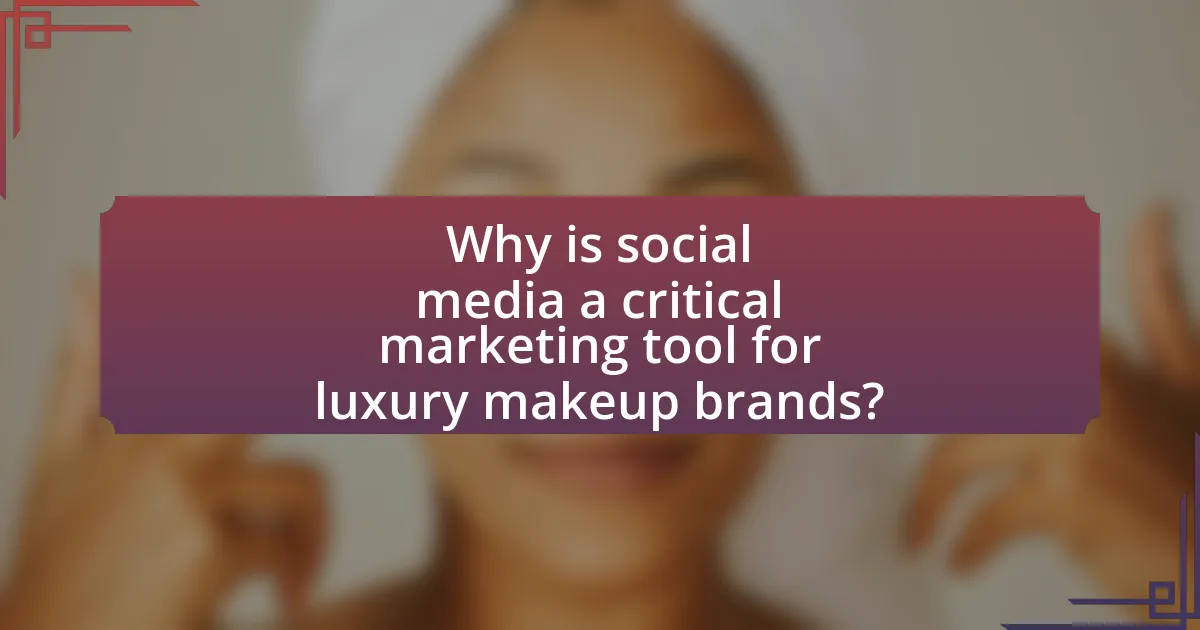
Why is social media a critical marketing tool for luxury makeup brands?
Social media is a critical marketing tool for luxury makeup brands because it enables direct engagement with consumers and enhances brand visibility. Luxury makeup brands leverage platforms like Instagram and TikTok to showcase products through visually appealing content, which resonates with their target audience. According to a study by McKinsey, 70% of consumers are influenced by social media when making purchasing decisions, highlighting its effectiveness in shaping consumer behavior. Additionally, social media allows for real-time feedback and interaction, fostering a sense of community and loyalty among consumers, which is essential for luxury brands aiming to maintain exclusivity and prestige.
What advantages do luxury makeup brands gain from social media marketing?
Luxury makeup brands gain significant advantages from social media marketing, primarily through enhanced brand visibility and consumer engagement. Social media platforms allow these brands to showcase their products visually, reaching a broader audience and creating aspirational content that resonates with consumers. For instance, a study by McKinsey & Company found that 70% of consumers are influenced by social media when making purchasing decisions, highlighting the effectiveness of these platforms in driving sales. Additionally, luxury brands can leverage user-generated content and influencer partnerships to build trust and authenticity, further solidifying their market presence. This strategic use of social media not only boosts brand loyalty but also facilitates direct communication with consumers, allowing for real-time feedback and personalized marketing efforts.
How does social media enhance brand visibility and awareness in the luxury segment?
Social media enhances brand visibility and awareness in the luxury segment by providing platforms for targeted marketing, influencer collaborations, and user-generated content. Luxury brands leverage social media to reach affluent consumers through tailored advertisements that resonate with their lifestyle and preferences. For instance, a study by McKinsey & Company found that 70% of consumers in the luxury market are influenced by social media when making purchasing decisions. Additionally, partnerships with high-profile influencers amplify brand messages, creating aspirational content that attracts attention and fosters engagement. This strategic use of social media not only increases brand recognition but also cultivates a sense of exclusivity and desirability, essential for luxury brands.
What metrics are used to measure the success of social media marketing in luxury makeup?
The metrics used to measure the success of social media marketing in luxury makeup include engagement rate, reach, conversion rate, and brand sentiment. Engagement rate, calculated through likes, shares, and comments, indicates how well content resonates with the audience. Reach measures the total number of unique users who see the content, reflecting brand visibility. Conversion rate tracks the percentage of users who take a desired action, such as making a purchase after engaging with social media content, demonstrating the effectiveness of marketing efforts. Brand sentiment analyzes customer feedback and perceptions, providing insights into how the luxury makeup brand is viewed in the market. These metrics collectively help brands assess their social media strategies and optimize their marketing efforts for better performance.
How do luxury makeup brands leverage social media for customer engagement?
Luxury makeup brands leverage social media for customer engagement by utilizing visually appealing content, influencer partnerships, and interactive features. These brands create high-quality images and videos showcasing their products, which resonate with their target audience and enhance brand aesthetics. For instance, brands like Fenty Beauty and Charlotte Tilbury frequently collaborate with beauty influencers who have large followings, effectively reaching potential customers through trusted voices. Additionally, luxury makeup brands engage customers through interactive features such as polls, live Q&A sessions, and user-generated content campaigns, which foster community and encourage direct interaction. According to a study by McKinsey, brands that actively engage with customers on social media can see a 20-40% increase in customer loyalty, highlighting the effectiveness of these strategies in building lasting relationships.
What strategies do brands use to create interactive experiences on social media?
Brands create interactive experiences on social media by utilizing strategies such as user-generated content, live streaming, and interactive polls. User-generated content encourages customers to share their experiences with products, fostering community engagement and authenticity. Live streaming allows brands to showcase products in real-time, enabling direct interaction with consumers through Q&A sessions. Interactive polls and quizzes engage users by inviting them to participate in decision-making processes, enhancing their connection to the brand. These strategies have been shown to increase consumer engagement and brand loyalty, as evidenced by a study from Sprout Social, which found that 70% of consumers feel more connected to brands that engage with them on social media.
How do luxury brands maintain exclusivity while engaging with consumers on social media?
Luxury brands maintain exclusivity while engaging with consumers on social media by curating content that emphasizes their heritage, craftsmanship, and limited availability. They often share behind-the-scenes insights, exclusive product launches, and collaborations with high-profile influencers, which creates a sense of privilege among followers. For instance, brands like Chanel and Gucci utilize selective storytelling and high-quality visuals to reinforce their brand identity, ensuring that their social media presence reflects luxury and sophistication. This strategy not only attracts a discerning audience but also fosters a community that values exclusivity, as evidenced by the significant engagement rates on their posts, which often exceed industry averages.
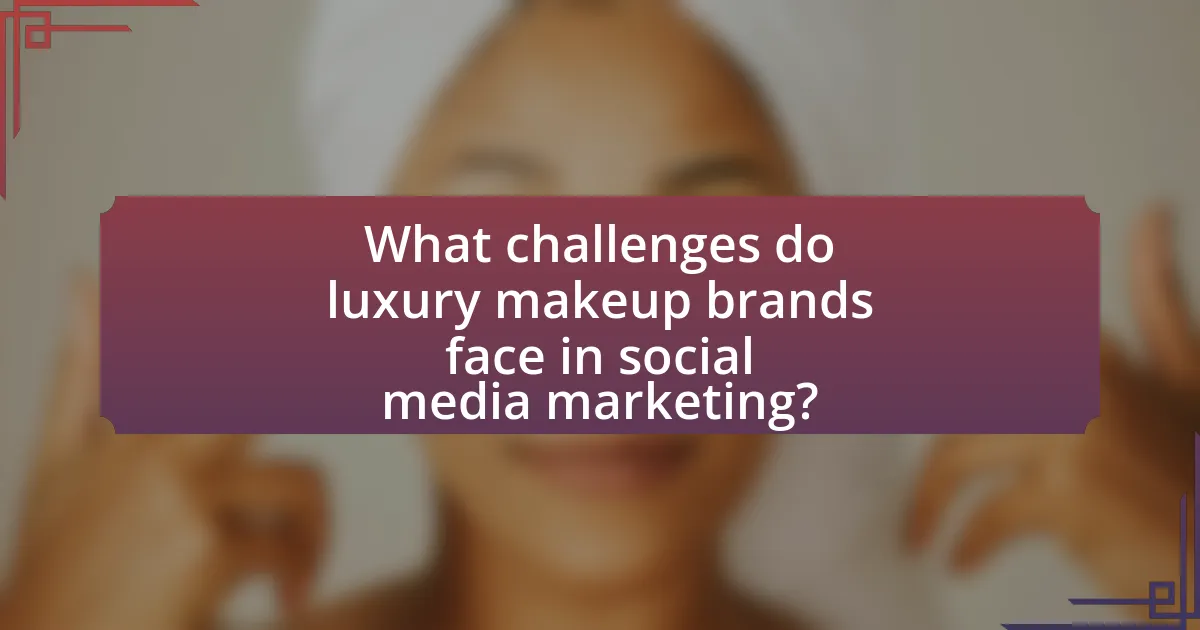
What challenges do luxury makeup brands face in social media marketing?
Luxury makeup brands face significant challenges in social media marketing, primarily due to the need to maintain brand exclusivity while engaging a broad audience. This tension arises because luxury brands must balance high-end image with the accessibility that social media platforms provide. For instance, the risk of diluting brand prestige is heightened when brands engage in influencer partnerships or user-generated content campaigns, which can attract a wider but less affluent customer base. Additionally, luxury brands often struggle with negative feedback and public scrutiny on social media, as any misstep can lead to rapid backlash, impacting brand reputation. According to a study by Bain & Company, luxury brands that effectively navigate these challenges can see a 70% increase in sales through social media channels, highlighting the importance of strategic marketing approaches.
How do negative feedback and reviews impact luxury makeup brands on social media?
Negative feedback and reviews significantly impact luxury makeup brands on social media by influencing consumer perception and purchasing decisions. When luxury brands receive negative reviews, it can lead to a decline in brand reputation, as consumers often rely on social proof from social media platforms to inform their choices. For instance, a study by the Harvard Business Review found that a one-star increase in Yelp ratings can lead to a 5-9% increase in revenue, highlighting the importance of positive feedback. Conversely, negative reviews can deter potential customers, as 79% of consumers trust online reviews as much as personal recommendations. This dynamic illustrates how negative feedback can create a ripple effect, ultimately affecting sales and brand loyalty in the luxury makeup sector.
What strategies can brands implement to manage their online reputation?
Brands can implement several strategies to manage their online reputation effectively. First, they should actively monitor social media platforms and online reviews to identify and address customer feedback promptly. Research indicates that 70% of consumers trust online reviews as much as personal recommendations, highlighting the importance of managing public perception. Additionally, brands can engage with their audience through transparent communication, responding to inquiries and complaints in a timely manner, which fosters trust and loyalty. Utilizing social listening tools can help brands track sentiment and trends, allowing them to adapt their strategies accordingly. Furthermore, creating high-quality content that showcases brand values and customer testimonials can enhance positive visibility. By employing these strategies, brands can maintain a favorable online reputation and influence consumer purchasing decisions effectively.
How do luxury makeup brands navigate the balance between authenticity and marketing on social media?
Luxury makeup brands navigate the balance between authenticity and marketing on social media by leveraging influencer partnerships and user-generated content to create genuine connections with their audience. These brands often collaborate with influencers who align with their values, ensuring that the messaging feels authentic rather than purely promotional. For instance, a study by the Journal of Business Research found that consumers are more likely to trust brands that engage with real users and showcase authentic experiences, leading to increased brand loyalty and purchase intention. By prioritizing transparency and engaging storytelling, luxury makeup brands effectively blend marketing strategies with authentic representation, enhancing their appeal in a competitive market.
What are the potential pitfalls of relying heavily on social media for luxury makeup sales?
Relying heavily on social media for luxury makeup sales can lead to several potential pitfalls, including brand dilution, negative consumer perception, and dependency on platform algorithms. Brand dilution occurs when luxury brands, traditionally associated with exclusivity, become too accessible or overly promoted on social media, potentially undermining their prestige. Negative consumer perception can arise from influencer partnerships that do not align with the brand’s values, leading to backlash and loss of credibility. Additionally, dependency on platform algorithms can result in inconsistent visibility; changes in algorithms can drastically affect reach and engagement, making sales unpredictable. These factors highlight the risks associated with an over-reliance on social media for luxury makeup sales.
How can brands mitigate risks associated with social media marketing?
Brands can mitigate risks associated with social media marketing by implementing a comprehensive social media strategy that includes monitoring brand mentions, engaging with customers, and establishing clear guidelines for content. Monitoring brand mentions allows brands to quickly address negative feedback or misinformation, which is crucial in maintaining a positive brand image. Engaging with customers fosters trust and loyalty, reducing the likelihood of backlash from dissatisfied consumers. Establishing clear guidelines for content ensures that all posts align with brand values and messaging, minimizing the risk of miscommunication or controversy. According to a study by the Pew Research Center, 69% of adults in the U.S. use social media, highlighting the importance of a proactive approach to manage brand reputation effectively.
What lessons can be learned from failed social media campaigns in the luxury makeup industry?
Failed social media campaigns in the luxury makeup industry highlight the importance of understanding target demographics and aligning messaging with brand values. For instance, campaigns that misinterpret consumer preferences or cultural sensitivities often result in backlash, as seen with the backlash against a high-profile brand that faced criticism for cultural appropriation in its marketing. Additionally, ineffective engagement strategies, such as failing to respond to customer feedback or ignoring negative comments, can lead to diminished brand loyalty and trust. Data shows that brands that actively engage with their audience and address concerns see a 20% increase in customer retention. Therefore, luxury makeup brands must prioritize authentic communication and cultural awareness to avoid the pitfalls observed in past campaigns.
What best practices should luxury makeup brands follow for effective social media marketing?
Luxury makeup brands should prioritize high-quality visual content and authentic influencer partnerships for effective social media marketing. High-quality visuals, including professional photography and engaging videos, attract attention and convey the luxury aspect of the brand, as evidenced by studies showing that posts with high-quality images receive 94% more views than those without. Authentic influencer partnerships enhance credibility and reach, with 49% of consumers relying on influencer recommendations for their purchasing decisions. Additionally, luxury brands should maintain a consistent brand voice and aesthetic across platforms to reinforce brand identity, as consistency can increase brand recognition by up to 80%. Engaging with followers through interactive content, such as polls and Q&A sessions, fosters community and loyalty, which is crucial in the luxury market where customer relationships are paramount.
How can brands create compelling content that resonates with their target audience?
Brands can create compelling content that resonates with their target audience by understanding their preferences and values, and tailoring messages accordingly. Research indicates that 70% of consumers prefer to learn about products through content rather than traditional advertising, highlighting the importance of engaging storytelling and authenticity. By utilizing data analytics to identify audience demographics and behaviors, brands can craft personalized content that aligns with the interests of their target market, ultimately enhancing engagement and driving conversions.
What role does data analytics play in refining social media strategies for luxury makeup brands?
Data analytics plays a crucial role in refining social media strategies for luxury makeup brands by enabling data-driven decision-making. By analyzing consumer behavior, engagement metrics, and market trends, luxury makeup brands can tailor their content to resonate with their target audience. For instance, brands can identify which types of posts generate the most engagement, allowing them to optimize their content strategy accordingly. Additionally, data analytics helps in segmenting audiences based on demographics and preferences, facilitating personalized marketing efforts. According to a report by McKinsey, companies that leverage data analytics effectively can increase their marketing ROI by up to 15-20%. This demonstrates that data analytics not only enhances social media strategies but also drives sales and brand loyalty in the luxury makeup sector.
